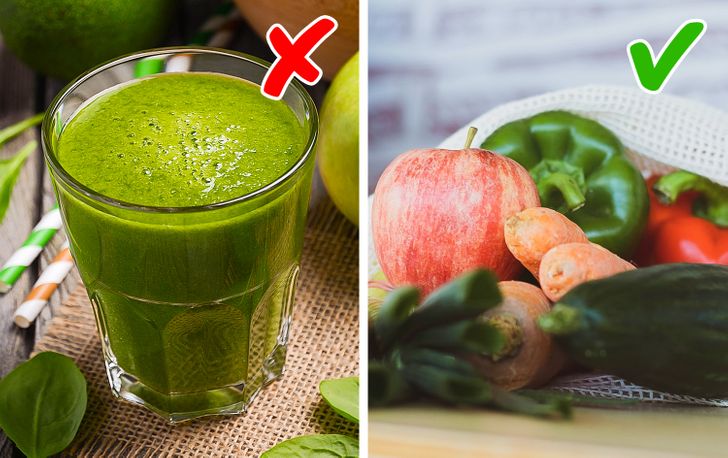In today’s fast-paced world of health trends and quick fixes, many of us embrace popular foods and drinks believing they’re beneficial for our well-being. However, even some of these “healthy” choices can have hidden drawbacks when consumed in excess or prepared in certain ways. In this post, we explore eight everyday items that might not be as wholesome as you think. By shedding light on potential risks and discussing scientific insights, our goal is to empower you to make more informed decisions about your diet.
As you navigate through each section, you’ll find detailed explanations on why these popular choices may carry unexpected health risks. Whether you’re interested in detox trends, natural remedies, or weight loss strategies, understanding the complete picture behind these items is crucial. Read on to learn more about lemon water, tea, dried fruit, agave syrup, low-calorie foods, protein powder, green juice, and gluten-free products, and discover balanced alternatives for a healthier lifestyle.
Lemon Water: More Than Just a Detox Trend?

Lemon water has become a staple in many detox routines and morning rituals due to its refreshing taste and perceived detoxifying properties. While the infusion of vitamin C and antioxidants can be beneficial, there are some concerns to consider.
Excessive consumption of lemon water, especially when sipped throughout the day, can lead to dental enamel erosion because of its high acidity. This erosion may increase the risk of cavities and tooth sensitivity. Moreover, for some individuals with gastrointestinal issues, the acidity may cause discomfort or exacerbate conditions like acid reflux. Moderation is key, and it’s important to balance lemon water with plain water to reduce potential damage.
For more insights on how acidic beverages impact dental health, check out Harvard Health Publishing and Mayo Clinic. Exploring alternative detox beverages that are lower in acidity may also be a wise choice for long-term wellness.
Tea: A Soothing Drink with Hidden Health Pitfalls?

Tea is celebrated worldwide for its antioxidants and calming properties. From green tea to black tea, its diverse varieties offer potential benefits such as improved metabolism and reduced risk of chronic diseases. However, tea may also carry some hidden health concerns that warrant closer inspection.
High consumption of tea, particularly caffeinated varieties, can lead to sleep disturbances and anxiety. Moreover, certain teas may contain trace amounts of heavy metals or contaminants, depending on their source and production methods. Research published by reputable sources like WebMD emphasizes the importance of moderation.
The discussion about tea also extends into how it interacts with medications. For example, compounds in tea may interfere with the absorption of certain nutrients or medications. As with any dietary element, choosing high-quality, organic teas and consuming them in moderation can help mitigate potential risks. This balanced approach ensures you enjoy tea’s benefits while keeping adverse effects at bay.
Dried Fruit: Nutritious Snack or Hidden Sugar Bomb?

Dried fruit is often touted as a nutrient-rich, portable snack, packed with vitamins, minerals, and fiber. However, it’s important to be aware of the processing methods that can transform a healthy snack into a high-calorie treat loaded with concentrated sugars.
Many commercially available dried fruits have added sugars and preservatives to extend their shelf life. This not only increases their calorie density but may also lead to spikes in blood sugar levels, especially for individuals with diabetes or those monitoring their carbohydrate intake.
For a balanced diet, consider selecting unsweetened, organic dried fruits and controlling portion sizes. This approach allows you to enjoy the nutritional benefits without inadvertently consuming excessive sugar. For more comprehensive guidance on making healthy snack choices, refer to resources like Mayo Clinic and Healthline.
Agave Syrup: The ‘Natural’ Sweetener With a Bitter Truth

Marketed as a healthier alternative to refined sugar, agave syrup has gained popularity among those looking for natural sweetening options. However, this sweetener’s high fructose content can be problematic. Fructose, when consumed in large amounts, is linked to insulin resistance, fatty liver disease, and metabolic issues.
Despite its natural origins, agave syrup undergoes extensive processing, which diminishes some of its touted benefits. The high fructose load means that even small amounts can contribute to adverse health effects over time. For those searching for “natural sweeteners” or “healthy sugar alternatives,” it’s crucial to recognize that not all natural products are automatically beneficial.
For further reading on the impact of fructose on health, trusted sources like Harvard Health Publishing provide in-depth analysis and research findings that are invaluable for anyone interested in nutritional science.
Low-Calorie Foods: The Dark Side of Diet-Friendly Choices

Low-calorie foods often make the list of healthy eating options for those aiming to lose weight. However, the low-calorie label can sometimes be misleading. Many low-calorie products are heavily processed and may contain artificial additives, preservatives, or sugar substitutes that could trigger cravings and metabolic imbalances.
The reliance on artificial sweeteners and additives to enhance flavor in low-calorie foods might disrupt your body’s natural hunger signals. Additionally, these ingredients have been linked in some studies to negative health outcomes, such as gastrointestinal disturbances and even an increased risk of metabolic syndrome.
For balanced nutrition, it is advisable to focus on whole, minimally processed foods that naturally provide a balance of nutrients. This not only supports sustainable weight loss but also contributes to overall health. For further information, resources like Healthline and Mayo Clinic offer detailed insights on the benefits of whole foods versus processed alternatives.
Protein Powder: Boost Your Gains Without the Hidden Dangers

Protein powders have become a go-to supplement for fitness enthusiasts and those looking to increase muscle mass. They are often seen as a quick and convenient source of high-quality protein. However, not all protein powders are created equal, and some may contain unwanted additives, contaminants, or excessive amounts of certain amino acids.
Quality and safety are major concerns when choosing a protein supplement. Lower-quality protein powders might include artificial flavors, sweeteners, and even traces of heavy metals due to poor manufacturing practices. It is crucial to look for products that are third-party tested and free from unnecessary additives.
Moreover, over-reliance on protein powder can sometimes lead to an imbalance in nutrient intake, potentially stressing the kidneys or leading to digestive issues. For those seeking natural sources of protein, lean meats, legumes, and dairy products remain excellent alternatives. For further reading, check out WebMD and Healthline for expert advice on protein supplementation and its role in a balanced diet.
Green Juice: The Overlooked Downsides of a Popular Health Craze

Green juice is widely embraced as a convenient way to consume a variety of vitamins and minerals from vegetables and leafy greens. While it offers a burst of nutrients in liquid form, it also has notable drawbacks. One key concern is that green juice often lacks the fiber that whole vegetables provide, which is essential for proper digestion and sustained energy release.
Without fiber, the natural sugars in green juice can lead to rapid spikes in blood sugar levels. This is particularly problematic for those with insulin resistance or diabetes. Additionally, commercial green juices may be high in sodium and preservatives, diluting their overall health benefits.
For those who love the convenience of green juice, consider blending your own at home to ensure maximum nutrient retention and fiber content. This approach not only preserves the natural benefits of the vegetables but also allows you to control the ingredients. For additional perspectives on the nutritional differences between juices and whole foods, reputable sources like Mayo Clinic and Harvard Health Publishing are excellent resources.
Gluten-Free Products: When ‘Healthy’ Alternatives May Backfire

Gluten-free products have become synonymous with health and wellness, especially for individuals with celiac disease or gluten sensitivity. However, many gluten-free items on the market are highly processed and may contain elevated levels of sugars, unhealthy fats, or artificial additives to mimic the texture of their gluten-containing counterparts.
For people without gluten sensitivities, these products can often be less nutritious than whole grains. The absence of gluten does not automatically translate into a healthier product; rather, the overall nutritional profile should be the focus.
It is crucial to read labels carefully and opt for naturally gluten-free foods—such as quinoa, buckwheat, and brown rice—that provide essential nutrients without the need for excessive processing. For further insights on gluten-free diets and their potential pitfalls, Harvard Health Publishing and Mayo Clinic offer comprehensive guidelines on choosing the best gluten-free options for overall health.
Conclusion: Striking the Balance for a Healthier Lifestyle
The modern quest for health and wellness often leads us to embrace trends and products without fully understanding their potential downsides. As explored in this post, even items considered healthy—such as lemon water, tea, dried fruit, agave syrup, low-calorie foods, protein powder, green juice, and gluten-free products—can pose risks if not consumed mindfully. The key takeaway is not to discard these products entirely but rather to enjoy them in moderation and as part of a balanced, varied diet.
Informed decisions are essential. Always scrutinize labels, seek out high-quality, minimally processed options, and consider consulting healthcare professionals for personalized advice. Reliable sources such as Harvard Health Publishing, Mayo Clinic, and Healthline provide valuable insights to help you navigate the complex world of nutrition and wellness.
By understanding both the benefits and potential pitfalls of popular dietary choices, you can make smarter decisions that enhance your long-term health. Keep an open mind, stay informed, and remember that balance and moderation are the cornerstones of a truly healthy lifestyle.
Preview photo credit Depositphotos.com, Depositphotos.com









Leave a Reply